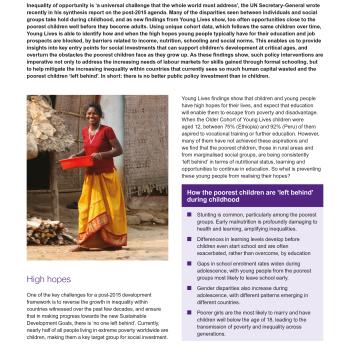Publication Information

Inequality of opportunity is ‘a universal challenge that the whole world must address’, the UN Secretary-General wrote recently in his synthesis report on the post-2015 agenda. Many of the disparities seen between individuals and social groups take hold during childhood, and as new findings from Young Lives show, too often opportunities close to the poorest children well before they become adults.
Using unique cohort data, which follows the same children over time, Young Lives is able to identify how and when the high hopes young people typically have for their education and job prospects are blocked, by barriers related to income, nutrition, schooling and social norms. This enables us to provide insights into key entry points for social investments that can support children’s development at critical ages, and overturn the obstacles the poorest children face as they grow up.
As these findings show, such policy interventions are imperative not only to address the increasing needs of labour markets for skills gained through formal schooling, but to help mitigate the increasing inequality within countries that currently sees so much human capital wasted and the poorest children ‘left behind’. In short: there is no better public policy investment than in children.

Inequality of opportunity is ‘a universal challenge that the whole world must address’, the UN Secretary-General wrote recently in his synthesis report on the post-2015 agenda. Many of the disparities seen between individuals and social groups take hold during childhood, and as new findings from Young Lives show, too often opportunities close to the poorest children well before they become adults.
Using unique cohort data, which follows the same children over time, Young Lives is able to identify how and when the high hopes young people typically have for their education and job prospects are blocked, by barriers related to income, nutrition, schooling and social norms. This enables us to provide insights into key entry points for social investments that can support children’s development at critical ages, and overturn the obstacles the poorest children face as they grow up.
As these findings show, such policy interventions are imperative not only to address the increasing needs of labour markets for skills gained through formal schooling, but to help mitigate the increasing inequality within countries that currently sees so much human capital wasted and the poorest children ‘left behind’. In short: there is no better public policy investment than in children.

